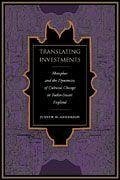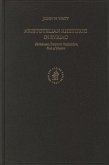In this wide-ranging book, Judith Anderson studies the functioning of metaphor as a constructive force within language, religious doctrine and politics, literature, rhetoric, and economics. Invoking a provocative metaphorical concept from Andy Clark's version of cognitive science, she construes metaphor as a form of scaffolding fundamental to human culture. A more traditional or controversial conception of this is ?sublation??Hegel's Aufhebung, or ?raising, ? as the philosophers Jacques Derrida and Paul Ricoeur have understood the term. From beginning to end, this study not only shows how history and theory can be mutually enlightening, but touches also upon the present, engaging questions about language, rhetoric, and reading within poststructuralism and neocognitivism. ?Translating Investments is a remarkable achievement. Its fine-grained discussions of theories of metaphor and translation from antiquity to contemporary philosophies of language and cognition frame a genuinely innovative examination of the early modern cultural syntax through which the figure of ?investment? became the lingua franca of schools of rhetoric, Eucharistic debates, devotional arts, fantasies of erotic violence, and emergent economic theories. Anderson has told an important story, one which enables readers to grasp often misunderstood or ignored links between topics as diverse as the famous Ricoeur-Derrida debates over metaphor, Ciceronian rhetoric, the Vestiarian controversy, Spenserian allegory, and the sacramental language of Gerrald de Malynes?writings on market economies. The book provides startling insights into the suppleness of the mechanisms of cultural change. Rarely has the chiaroscuro of thedominant culture been so acutely portrayed.??Lowell Gallagher, University of California, Los Angeles








